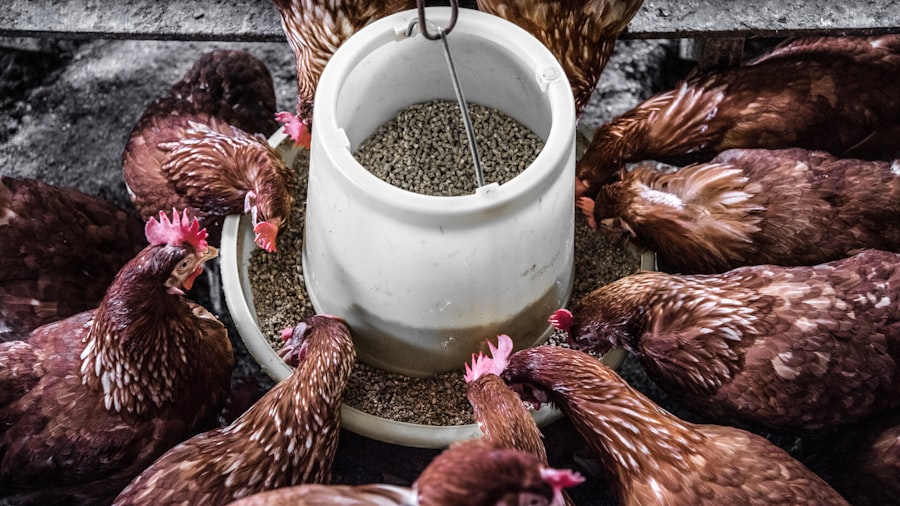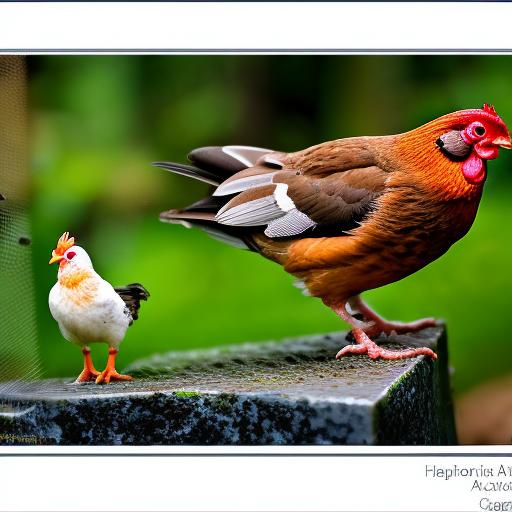Keeping chickens in your garden can be a rewarding and fulfilling experience. Not only do they provide fresh eggs every day, but they also offer natural pest control and fertilizer for your garden. However, before you embark on this venture, it is important to understand the rules and regulations for keeping chickens in London.
In London, there are specific rules and regulations that govern the keeping of chickens in residential areas. These rules are in place to ensure the welfare of the chickens and to prevent any nuisance or health issues for neighbors. It is important to familiarize yourself with these rules to avoid fines and legal issues.
Some of the common regulations include restrictions on the number of chickens you can keep, the size and location of the chicken coop, and the disposal of chicken waste. For example, in most residential areas, you are allowed to keep up to four chickens without needing planning permission. However, it is always best to check with your local council for specific regulations in your area.
By following these rules and regulations, you can enjoy the benefits of keeping chickens in your garden without any legal issues or conflicts with your neighbors.
Key Takeaways
- Keeping chickens in London is regulated by specific rules and regulations.
- Keeping chickens in your garden can provide benefits such as fresh eggs and natural pest control.
- Choosing the right breed of chicken for your garden depends on factors such as egg production and temperament.
- Building a chicken coop requires essential features such as ventilation and predator protection.
- Maintaining a clean and healthy chicken coop involves regular cleaning and monitoring for signs of illness.
Benefits of Keeping Chickens in Your Garden
Keeping chickens in your garden offers a multitude of benefits that go beyond just having fresh eggs every day. Here are some of the key benefits:
1. Fresh eggs every day: One of the main reasons people choose to keep chickens is for the fresh eggs they provide. There is nothing quite like collecting eggs from your own backyard and knowing exactly where they came from. Not only do they taste better than store-bought eggs, but they are also more nutritious.
2. Natural pest control: Chickens are excellent at controlling pests in your garden. They love to eat insects, slugs, snails, and even small rodents. By allowing them to roam freely in your garden during the day, you can reduce the need for chemical pesticides and keep your garden pest-free.
3. Fertilizer for your garden: Chicken manure is a rich source of nutrients for your garden. It is high in nitrogen, phosphorus, and potassium, which are essential for plant growth. By adding chicken manure to your compost or directly to your garden beds, you can improve soil fertility and promote healthy plant growth.
4. Educational experience for children: Keeping chickens in your garden can be a valuable educational experience for children. They can learn about where their food comes from, the life cycle of chickens, and the responsibility of caring for animals. It teaches them important values such as compassion, empathy, and sustainability.
Choosing the Right Breed of Chicken for Your Garden
When it comes to choosing the right breed of chicken for your garden, there are several factors to consider. These include the size of your garden, the climate in your area, and your personal preferences.
Some popular breeds for backyard chicken keeping include:
1. Rhode Island Red: This breed is known for its excellent egg-laying capabilities and friendly temperament. They are hardy birds that can adapt to a variety of climates.
2. Sussex: Sussex chickens are known for their docile nature and ability to lay a good number of eggs. They come in a variety of colors and are well-suited to both small and large gardens.
3. Orpington: Orpington chickens are large, friendly birds that are known for their excellent meat quality and broodiness. They come in a variety of colors and are well-suited to colder climates.
Personal experience with different breeds can also play a role in choosing the right breed for your garden. It is always helpful to talk to other chicken keepers or visit local poultry shows to get a better understanding of different breeds and their characteristics.
Building the Perfect Chicken Coop for Your Garden
A well-built chicken coop is essential for the health and safety of your chickens. It provides them with shelter, protection from predators, and a comfortable place to lay their eggs. When building a chicken coop, there are several important factors to consider.
Firstly, the size of the coop should be appropriate for the number of chickens you plan to keep. The general rule of thumb is to allow at least 4 square feet of floor space per chicken. This will ensure that they have enough room to move around and engage in natural behaviors.
Secondly, the materials used for building the coop should be sturdy and predator-proof. The coop should be made from materials such as wood or metal that can withstand the elements and keep predators out. It is also important to consider proper ventilation to prevent moisture buildup and ensure good air circulation.
Lastly, the design of the coop should fit your garden and the needs of your chickens. Consider factors such as ease of cleaning, accessibility to nesting boxes and roosting bars, and protection from extreme weather conditions.
Essential Features of a Chicken Coop
A well-designed chicken coop should include several essential features to ensure the comfort and safety of your chickens. These features include:
1. Nesting boxes: Chickens need a quiet and private space to lay their eggs. Nesting boxes provide them with a suitable place to do so. Each nesting box should be large enough for a chicken to comfortably sit in and lined with soft bedding material such as straw or wood shavings.
2. Roosting bars: Chickens naturally roost at night, so it is important to provide them with roosting bars inside the coop. These bars should be placed at a height that allows the chickens to comfortably perch and sleep.
3. Ventilation: Proper ventilation is crucial for maintaining good air quality inside the coop. It helps to remove excess moisture, ammonia, and odors, which can lead to respiratory issues for the chickens. Ventilation can be achieved through windows, vents, or openings in the coop.
4. Security measures: Predators such as foxes, raccoons, and rats can pose a threat to your chickens. It is important to include security measures such as sturdy fencing, locks on doors and windows, and burying wire mesh around the perimeter of the coop to prevent predators from digging under.
Chicken Coop Plan: Step-by-Step Guide to Building Your Own Coop

Building your own chicken coop can be a rewarding and cost-effective option. Here is a step-by-step guide to help you build your own coop:
1. Determine the size and design of your coop based on the number of chickens you plan to keep and the available space in your garden.
2. Gather the necessary materials, including wood for framing, wire mesh for fencing, roofing material, screws or nails, and any additional features such as nesting boxes and roosting bars.
3. Start by building the frame of the coop using the wood. This will serve as the foundation for the rest of the structure.
4. Attach the wire mesh to the frame to create a secure enclosure for your chickens. Make sure to bury wire mesh around the perimeter of the coop to prevent predators from digging under.
5. Install the roofing material to provide protection from rain and other elements.
6. Add any additional features such as nesting boxes and roosting bars inside the coop.
7. Finish by adding doors and windows that can be securely locked to keep predators out.
Remember to customize the coop based on your specific needs and preferences. You can add features such as windows for additional ventilation, ramps for easy access, or even a run attached to the coop for more space for your chickens to roam.
Maintaining a Clean and Healthy Chicken Coop
Maintaining a clean and healthy chicken coop is essential for the well-being of your chickens. A clean coop helps to prevent the spread of diseases, reduces odors, and provides a comfortable environment for your chickens. Here are some tips for cleaning and maintaining a coop:
1. Regularly remove soiled bedding and replace it with fresh bedding. This will help to keep the coop clean and prevent the buildup of ammonia and odors.
2. Clean the nesting boxes regularly to remove any soiled bedding or eggs. This will help to prevent egg breakage and discourage broodiness.
3. Scrub the coop walls, floors, and roosting bars with a mild detergent or disinfectant to remove any dirt or bacteria. Rinse thoroughly with water and allow it to dry before adding fresh bedding.
4. Check for any signs of pests such as mites or lice and treat them accordingly. Regularly inspect the coop for any signs of damage or wear and repair as needed.
Feeding and Caring for Your Chickens
Proper nutrition is essential for the health and well-being of your chickens. Here are some tips for feeding and caring for your chickens:
1. Provide a balanced diet that includes a combination of commercial chicken feed, fresh fruits and vegetables, and access to forage. Commercial chicken feed should make up the majority of their diet and should be specifically formulated for their age and purpose (layers, meat birds, etc.).
2. Ensure that your chickens have access to clean water at all times. Water should be changed daily to prevent contamination.
3. Provide grit or oyster shell to help with digestion and eggshell formation.
4. Monitor your chickens’ health regularly by checking their feathers, eyes, beaks, feet, and overall behavior. Look out for any signs of illness or distress such as lethargy, loss of appetite, or abnormal droppings.
5. Provide enrichment activities such as dust baths, perches, and toys to keep your chickens mentally stimulated and prevent boredom.
Personal experience with chicken care can also play a role in determining the best practices for feeding and caring for your chickens. It is always helpful to talk to other chicken keepers or consult with a veterinarian for specific advice.
Dealing with Common Problems When Keeping Chickens in Your Garden
Keeping chickens in your garden can come with its fair share of challenges. Here are some common problems you may encounter and tips for dealing with them:
1. Predators: Predators such as foxes, raccoons, and rats can pose a threat to your chickens. To deter predators, make sure your coop is secure and predator-proof. Use sturdy fencing, locks on doors and windows, and bury wire mesh around the perimeter of the coop to prevent predators from digging under.
2. Egg-laying issues: Some chickens may experience egg-laying issues such as soft-shelled eggs or egg-binding. Ensure that your chickens have a balanced diet, access to fresh water, and a comfortable nesting area. If issues persist, consult with a veterinarian for further advice.
3. Health problems: Chickens can be susceptible to various health issues such as respiratory infections, parasites, or nutritional deficiencies. Regularly monitor your chickens’ health and seek veterinary care if you notice any signs of illness or distress.
4. Noise and odor: Chickens can be noisy at times, especially when they are laying eggs or when they feel threatened. To minimize noise, consider placing the coop away from neighboring properties or use soundproofing materials. To reduce odor, regularly clean the coop and provide proper ventilation.
Is Keeping Chickens in Your Garden Right for You?
Keeping chickens in your garden can be a rewarding and fulfilling experience. It offers a range of benefits such as fresh eggs, natural pest control, fertilizer for your garden, and an educational experience for children. However, it is important to understand the rules and regulations for keeping chickens in your area to avoid fines and legal issues.
Choosing the right breed of chicken, building a well-designed coop, and maintaining a clean and healthy environment are essential for the well-being of your chickens. Feeding and caring for your chickens properly, as well as dealing with common problems that may arise, are also important aspects to consider.
Before deciding to keep chickens in your garden, it is important to do further research and consider if it is the right fit for you and your garden. Talk to other chicken keepers, visit local poultry shows, and consult with professionals to gather more information and make an informed decision.
If you’re considering keeping chickens in your garden in London, you may also be interested in turning a shed into a chicken coop. This article from Poultry Wizard provides a step-by-step guide on how to transform a shed into a comfortable and functional space for your feathered friends. From insulation and ventilation to nesting boxes and perches, this resource covers everything you need to know to create a safe and cozy home for your chickens. Check out the article here for more information on this exciting project.
FAQs
Can I keep chickens in my garden in London?
Yes, you can keep chickens in your garden in London, but there are certain rules and regulations that you need to follow.
What are the rules and regulations for keeping chickens in London?
The rules and regulations for keeping chickens in London vary depending on the borough you live in. However, in general, you need to ensure that your chickens are kept in a secure and suitable environment, and that they do not cause a nuisance to your neighbors.
Do I need a license to keep chickens in my garden in London?
No, you do not need a license to keep chickens in your garden in London. However, you may need to register your chickens with your local council.
How many chickens can I keep in my garden in London?
The number of chickens you can keep in your garden in London depends on the size of your garden and the regulations in your borough. In general, most boroughs allow up to six chickens to be kept in a garden.
What kind of housing do I need for my chickens?
You need to provide your chickens with a secure and suitable housing that protects them from predators and the weather. The housing should be large enough for your chickens to move around freely and should have nesting boxes for them to lay eggs.
What do I feed my chickens?
You can feed your chickens with a variety of foods, including chicken feed, grains, vegetables, and fruits. You should also ensure that your chickens have access to clean water at all times.
Do I need to clean my chicken coop?
Yes, you need to clean your chicken coop regularly to ensure that it is hygienic and free from pests and diseases. You should also change the bedding in the coop regularly.
Meet Walter, the feathered-friend fanatic of Florida! Nestled in the sunshine state, Walter struts through life with his feathered companions, clucking his way to happiness. With a coop that’s fancier than a five-star hotel, he’s the Don Juan of the chicken world. When he’s not teaching his hens to do the cha-cha, you’ll find him in a heated debate with his prized rooster, Sir Clucks-a-Lot. Walter’s poultry passion is no yolk; he’s the sunny-side-up guy you never knew you needed in your flock of friends!







